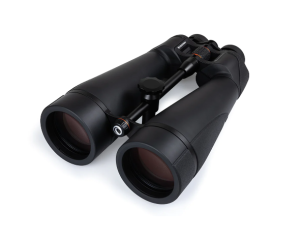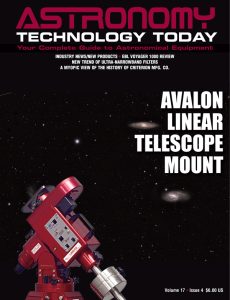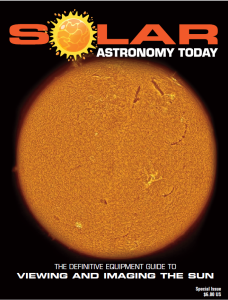The new Celestron SkyMaster Pro ED binoculars are the ideal choice for amateur astronomers or anyone who observes at great distances. The binoculars come in 7X50MM, 15X70MM and 20X80MM configurations.
 The SkyMaster Pro ED uses superior optics, coatings, internal parts and housing materials. With large objective lenses, BaK-4 prisms, ED glass, and fully multi-coated optics utilizing Celestron’s proprietary XLT coating technology, the view through a SkyMaster Pro ED provides clear, vivid images. They are waterproof and nitrogen filled to perform well in all types of weather.
The SkyMaster Pro ED uses superior optics, coatings, internal parts and housing materials. With large objective lenses, BaK-4 prisms, ED glass, and fully multi-coated optics utilizing Celestron’s proprietary XLT coating technology, the view through a SkyMaster Pro ED provides clear, vivid images. They are waterproof and nitrogen filled to perform well in all types of weather.
The Extra-Low Dispersion (ED) glass virtually eliminates chromatic aberration, also known as color fringing, a visual phenomenon common in magnified optical systems. SkyMaster Pro ED delivers edge-to-edge sharpness with excellent color correction and razor-sharp images. As the Celestron team notes, “Not all ED glass is created equal. Celestron’s high-quality ED glass delivers brighter, sharper images than non-ED binoculars. The difference is especially apparent in low-light conditions.
All of Celestron SkyMaster Pro ED binoculars offer lens surfaces that are fully multi-coated and feature Celestron’s proprietary XLT optical coating technology. As the Celestron team notes, “These powerful coatings, similar to the ones you’ll find on our observatory-grade telescopes, decrease reflectivity for higher optical throughput across a broad range of the visible light spectrum. What’s more, the prisms inside the binocular are made of high-quality BaK-4 glass, further boosting light transmission. Working together, the fully multi-coated lenses and BaK-4 prisms deliver more light from your target to your eye for brighter, more detailed views.”
The custom-designed rubber armor and a durable chassis protect each SkyMaster Pro ED binocular from damage without weighing you down. Viewing through SkyMaster Pro ED binoculars is comfortable for eyeglass and non-eyeglass wearers alike, thanks to the retractable eyecups and nearly 21mm of eye relief. Eyeglass wearers can see the entire field of view while looking through the eyepiece with their glasses by twisting the eyecups down. For those who do not wear eyeglasses, the eyecups position the user’s eye behind the eyepieces at the correct distance for optimal viewing.
The Celestron SkyMaster Pro ED binocular lineup is tripod-adaptable. You can use a binocular tripod adapter to mount the binoculars on any standard photographic tripod or monopod for extended viewing or digiscoping (photography through the eyepiece).
SkyMaster Pro ED’s eyepieces are threaded to accept standard 1.25” astronomical eyepiece filters (as a reminder, the binoculars needs a set of two filters). Adding the right filter can deliver game-changing views for terrestrial and celestial observing. For terrestrial observation, filters can reduce the brightness of sand, snow, and water. For nighttime viewing, filters can cut glare, minimize eye strain, increase contrast, and even combat the effects of light pollution.
Each of the Celestron SkyMaster Pro ED binoculars are shipped with:
– Objective lens caps
– Eyepiece Covers
– Rainguard
– Neck strap
– Lens cloth
– Non-Silica Dessicant
– Case
– Instruction manual
Specifications for the Celestron SkyMaster Pro ED 7X50MM Binoculars include:
– Magnification: 7x
– Objective Lens Diameter: 50mm (1.97″)
– Angular Field of View: 7.8°
– Linear Field of View (@1000 yds) / @1000 m): 409 ft (136 m)
– Exit Pupil: 6.4mm (.25″)
– Eye Relief: 20.8mm (.82″)
– Close Focus: 26.2 ft (8 m)
– Interpupillary Distance (max): 72mm (2.83″)
– Interpupillary Distance (min): 56mm (2.20″)
– Diopter Adjustment Range: ±3
– Twilight Factor: 18.7
– Relative Brightness: 51.02
– Limiting Stellar Magnitude: Ideal: 10.99 | Moderate: 9.99 | Poor: 8.99
– Weight: 44.3 oz (1,255g)
– Dimensions: 180mm x 198mm x 64mm (7.1″ x 7.8″ x 2.5″)
Specifications for the Celestron SkyMaster Pro ED 15X70MM Binoculars include:
– Magnification: 15x
– Objective Lens Diameter: 70mm (2.75″)
– Angular Field of View: 4.4°
– Linear Field of View (@1000 yds) / @1000 m): 230 ft (77 m)
– Exit Pupil: 4.4mm (.17″)
– Eye Relief: 15.7mm (.62″)
– Close Focus: 42.7 ft (13 m)
– Interpupillary Distance (max): 72mm (2.83″)
– Interpupillary Distance (min): 56mm (2.20″)
– Diopter Adjustment Range: ±3
– Twilight Factor: 32.4
– Relative Brightness: 21.78
– Limiting Stellar Magnitude: Ideal: 11.73 | Moderate: 10.73 | Poor: 9.73
– Weight: 73.7 oz (2,089g)
– Dimensions: 258mm x 220mm x 85mm (10.2″ x 8.7″ x 3.4″)
Specifications for the Celestron SkyMaster Pro ED 20X80MM Binoculars include:
– Magnification: 20x
– Objective Lens Diameter: 80mm (3.15″)
– Angular Field of View: 3.4°
– Linear Field of View (@1000 yds) / @1000 m): 178 ft (59 m)
– Exit Pupil: 4.0mm (.16″)
– Eye Relief: 15.4mm (.61″)
– Close Focus: 98.4 ft (30 m)
– Interpupillary Distance (max): 72mm (2.83″)
– Interpupillary Distance (min): 56mm (2.20″)
– Diopter Adjustment Range: ±3
– Twilight Factor: 40
– Relative Brightness: 16
– Limiting Stellar Magnitude: Ideal: 12.02 | Moderate: 11.02 | Poor: 10.02
– Weight: 123.2 oz (3,492g)
– Dimensions:335mm x 230mm x 94mm (13.2″ x 9.1″ x 3.7″)
You can learn more about the Celestron SkyMaster Pro ED binoculars here.

 And to make it easier for you to get the most extensive news, articles and reviews that are only available in the magazine pages of Astronomy Technology Today, we are offering a 1-year magazine subscription for only $6! Or, for an even better deal, we are offering 2 years for only $9. Click here to get these deals which only will be available for a very limited time. You can also check out a free sample issue here.
And to make it easier for you to get the most extensive news, articles and reviews that are only available in the magazine pages of Astronomy Technology Today, we are offering a 1-year magazine subscription for only $6! Or, for an even better deal, we are offering 2 years for only $9. Click here to get these deals which only will be available for a very limited time. You can also check out a free sample issue here.
The Sun is more active than it’s been in years and if that’s not enough, we have the Annular Solar Eclipse on October 14, 2023 and the Total Solar Eclipse on April 8, 2024! If you’d like to learn more about the technology behind solar observing, solar imaging and more, you can check out our free publication, “The Definitive Guide to Viewing and Imaging the Sun”. You don’t have to sign up or provide any information, simply click here and enjoy reading!

